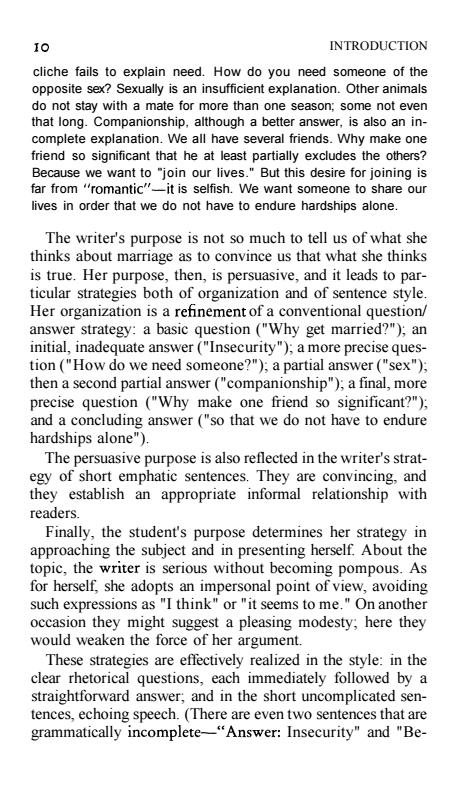正在加载图片...

10 INTRODUCTION cliche fails to explain need.How do you need someone of the opposite sex?Sexually is an insufficient explanation.Other animals do not stay with a mate for more than one season;some not even that long.Companionship,although a better answer,is also an in- complete explanation.We all have several friends.Why make one friend so significant that he at least partially excludes the others? Because we want to "join our lives."But this desire for joining is far from "romantic"-it is selfish.We want someone to share our lives in order that we do not have to endure hardships alone. The writer's purpose is not so much to tell us of what she thinks about marriage as to convince us that what she thinks is true.Her purpose,then,is persuasive,and it leads to par- ticular strategies both of organization and of sentence style Her organization is a refinement of a conventional question/ answer strategy:a basic question("Why get married?");an initial,inadequate answer("Insecurity");a more precise ques- tion("How do we need someone?");a partial answer("sex"); then a second partial answer ("companionship");a final,more precise question ("Why make one friend so significant?"); and a concluding answer("so that we do not have to endure hardships alone"). The persuasive purpose is also reflected in the writer's strat- egy of short emphatic sentences.They are convincing,and they establish an appropriate informal relationship with readers. Finally,the student's purpose determines her strategy in approaching the subject and in presenting herself.About the topic,the writer is serious without becoming pompous.As for herself,she adopts an impersonal point of view,avoiding such expressions as "I think"or "it seems to me."On another occasion they might suggest a pleasing modesty;here they would weaken the force of her argument. These strategies are effectively realized in the style:in the clear rhetorical questions,each immediately followed by a straightforward answer;and in the short uncomplicated sen- tences,echoing speech.(There are even two sentences that are grammatically incomplete-"Answer:Insecurity"and "Be-IO INTRODUCTION cliche fails to explain need. How do you need someone of the opposite sex? Sexually is an insufficient explanation. Other animals do not stay with a mate for more than one season; some not even that long. Companionship, although a better answer, is also an incomplete explanation. We all have several friends. Why make one friend so significant that he at least partially excludes the others? Because we want to "join our lives." But this desire for joining is far from "romantic"—it is selfish. We want someone to share our lives in order that we do not have to endure hardships alone. The writer's purpose is not so much to tell us of what she thinks about marriage as to convince us that what she thinks is true. Her purpose, then, is persuasive, and it leads to particular strategies both of organization and of sentence style. Her organization is a refinement of a conventional question/ answer strategy: a basic question ("Why get married?"); an initial, inadequate answer ("Insecurity"); a more precise question ("How do we need someone?"); a partial answer ("sex"); then a second partial answer ("companionship"); a final, more precise question ("Why make one friend so significant?"); and a concluding answer ("so that we do not have to endure hardships alone"). The persuasive purpose is also reflected in the writer's strategy of short emphatic sentences. They are convincing, and they establish an appropriate informal relationship with readers. Finally, the student's purpose determines her strategy in approaching the subject and in presenting herself. About the topic, the writer is serious without becoming pompous. As for herself, she adopts an impersonal point of view, avoiding such expressions as "I think" or "it seems to me." On another occasion they might suggest a pleasing modesty; here they would weaken the force of her argument. These strategies are effectively realized in the style: in the clear rhetorical questions, each immediately followed by a straightforward answer; and in the short uncomplicated sentences, echoing speech. (There are even two sentences that are grammatically incomplete—"Answer: Insecurity" and "Be-